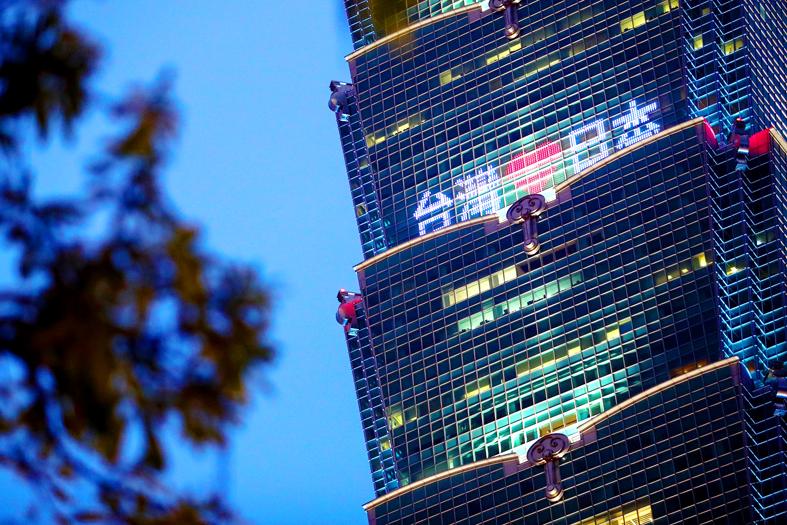Most people in Taiwan regard Japan as the world’s most likable country, a survey released yesterday by the Japan-Taiwan Exchange Association said.
Sixty percent of the respondents chose “Japan” when asked to name their “most likable country/region.”
China and the US polled at 7 percent and 6 percent respectively.

Photo: CNA
Sixty-eight percent of people from eastern Taiwan named Japan as the most likable, followed by 65 percent in the south choosing Japan, 59 percent in central Taiwan and 57 percent in the north, it showed.
In terms of age, 73 percent of those who chose Japan were in their 30s, followed by 71 percent in their 40s, 65 percent in their 20s, 51 percent above 65, and 47 percent aged 50 to 64.
Another question asked: “What country/region should Taiwan grow closer to?”
Japan was named by 46 percent of respondents, followed by the US at 24 percent and China at 15 percent, the poll showed.
On this question, 55 percent from eastern Taiwan named Japan, 50 percent in the central region, 45 in the south and 44 percent in the north.
By age, 57 percent were in their 40s, 54 percent in their 30s, 50 percent in their 20s, 41 percent above 65, and 34 percent aged 50 to 64.
The poll also showed that 70 percent of respondents considered the relationship between Japan and Taiwan as “good” — up 17 percentage points from the previous poll in 2019 — and only 2 percent considered the relationship as “bad.”
Sixty percent of the respondents saw Japan as trustworthy — up 10 points from the 2019 poll. Eight percent said the opposite.
Asked whether they felt close to Japan, 77 percent of the respondents answered “yes” — up from 70 percent from the 2019 poll — and 6 percent said “no.”
Taiwanese have grown to like and trust Japan more, and have a more positive attitude toward the relationship between the two countries, the association said.
The poll was conducted from Jan. 5 to Jan. 20 among people in Taiwan, aged 20 to 80, the association said, adding that it collected 1,068 valid samples with a margin of error of 3.06 percent.
Additional reporting by CNA

Taiwan is stepping up plans to create self-sufficient supply chains for combat drones and increase foreign orders from the US to counter China’s numerical superiority, a defense official said on Saturday. Commenting on condition of anonymity, the official said the nation’s armed forces are in agreement with US Admiral Samuel Paparo’s assessment that Taiwan’s military must be prepared to turn the nation’s waters into a “hellscape” for the Chinese People’s Liberation Army (PLA). Paparo, the commander of the US Indo-Pacific Command, reiterated the concept during a Congressional hearing in Washington on Wednesday. He first coined the term in a security conference last

Prosecutors today declined to say who was questioned regarding alleged forgery on petitions to recall Democratic Progressive Party (DPP) legislators, after Chinese-language media earlier reported that members of the Chinese Nationalist Party (KMT) Youth League were brought in for questioning. The Ministry of Justice Investigation Bureau confirmed that two people had been questioned, but did not disclose any further information about the ongoing investigation. KMT Youth League members Lee Hsiao-liang (李孝亮) and Liu Szu-yin (劉思吟) — who are leading the effort to recall DPP caucus chief executive Rosalia Wu (吳思瑤) and Legislator Wu Pei-yi (吳沛憶) — both posted on Facebook saying: “I

The Ministry of Economic Affairs has fined Taobao NT$1.2 million (US$36,912) for advertisements that exceed its approved business scope, requiring the Chinese e-commerce platform to make corrections in the first half of this year or its license may be revoked. Lawmakers have called for stricter enforcement of Chinese e-commerce platforms and measures to prevent China from laundering its goods through Taiwan in response to US President Donald Trump’s heavy tariffs on China. The Legislative Yuan’s Finance Committee met today to discuss policies to prevent China from dumping goods in Taiwan, inviting government agencies to report. Democratic Progressive Party Legislator Kuo Kuo-wen (郭國文) said

Sung Chien-liang (宋建樑), who led efforts to recall Democratic Progressive Party (DPP) Legislator Lee Kun-cheng (李坤城), was released on bail of NT$80,000 today amid outcry over his decision to wear a Nazi armband to questioning the night before. Sung arrived at the New Taipei District Prosecutors’ Office for questioning in a recall petition forgery case last night wearing a red armband bearing a swastika, carrying a copy of Adolf Hitler’s Mein Kampf and giving a Nazi salute. Sung left the building at 1:15am without the armband and covering the book with his coat. Lee said today that this is a serious